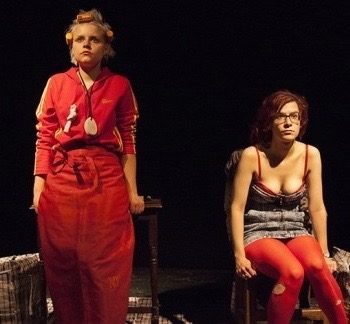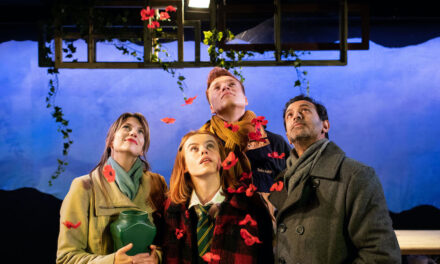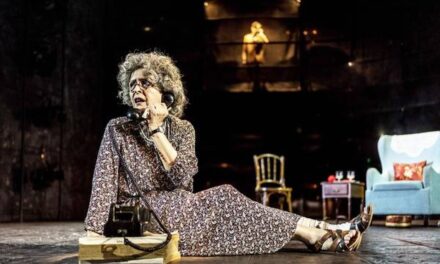The provocative title Eastern European For Dummies, an “interactive immigration piece” by There There theatre company, certainly gave a sense of what this show promised. At the start, only fifteen audience members were allowed into the room, equipped with an activity pack about Eastern Europeans (or, to use the abbreviation, EEs). Onstage an interactive exhibition introduced an “educational and structured way to immerse yourself in the world of Eastern Europeans”: there was the “Wheel of Benefits,” which let you spin for state hand-outs (you would only receive the single benefit you won, like “TV license”); the “Passport in a Ball,” giving you a chance of winning citizenship by throwing bags of tea into a pot (no one managed); and “Hook a Job,” which let you angle ducks in a kids’ pool to secure your job before an EE could take it (“highly skilled plumber” being one of them). There was also the activity pack to be filled in – including a missing-word round of tabloid headlines like “European criminal gangs hop on budget flights for burglary day trips to the UK” – along with a country-guessing map and a test to be completed should an EE have stolen your job.
There There’s performance, which started after everyone had done their homework, was a mixture of showcasing “anthropological types of EE” and a quiz show that would grant one of them citizenship and force the other to leave. The two “exhibits,” Dana Olărescu and Bojana Janković, didn’t speak for themselves but were described by a narrator with a “proper” English accent, Richard Cunningham. He introduced the “ridiculous Romanian” and the “savage Serb” with some “basic characterizations”: EEs tend to know many languages, are very well educated (and so can be annoyed by being unpaid and given menial jobs), like to take off their shoes in the house, put doilies everywhere and hate each other: most EEs hate Romanians, Romanians hate Hungarians’ etc. Olărescu and Janković, dressed in a tracksuit and a slinky dress, played out the stereotypes of the rough, uncivilized EEs by eating raw beans from a can, cleaning themselves with water from the kids’ pool and playing with a variety of sharp knives on a stage decorated with cut-up, reusable carrier bags.
After teaching us how to make the EEs life as uncomfortable as possible – for example by laughing at them for not knowing the different pronunciations of “v” and “w” – the Romanian and the Serb had to compete against each other in the citizenship test with questions like “What is the distance between the north of Scotland and the south-west of England?” Romania lost and had to leave the country, but only after Cunningham’s revelation that all Romanians are vampires, and so it’s safest to wear garlic and crucifixes when among them. The most uncomfortable part came at the end of the performance, when the audience had to stand up for the British National Anthem as the Serb was sworn in as a British citizen, before joining her onstage for a group picture as thanks went out to David (Cameron), Theresa (May) and Nigel (Farage) for inspiring the performance.
The final part particularly created a feeling of unease, ending the event with a confusion that overshadowed the applause. As such, the show’s purpose of making people think by showing the ridiculousness of exaggerated EE stereotypes created in the media and by the government was without a doubt successful – and, with the EU referendum looming over our heads, Eastern European For Dummies was particularly topical.
The most interesting aspect was its engagement with the audience: it felt different to be implicated in the creation of these stereotypes – especially if you’re a foreigner yourself and familiarize yourself with nonsensical prejudice. This was the real novelty factor of the show, the interactive exhibition adding something uncomfortably playful in this context – similar to older works of the kind, like Christoph Schlingensief’s Please Love Austria (2000), a Big Brother-style show where the public could vote asylum seekers out of the country. Linked to this tradition of activism, art and performance, Eastern Europeans For Dummies was thought-provoking not so much for its all-too-familiar content, but the way it made the audience complicit in nationalist ways of thinking.
This article originally appeared in Central and Eastern European London Review on March 22nd, 2016 and has been reposted with permission.
This post was written by the author in their personal capacity.The opinions expressed in this article are the author’s own and do not reflect the view of The Theatre Times, their staff or collaborators.
This post was written by Julia Secklehner.
The views expressed here belong to the author and do not necessarily reflect our views and opinions.


















